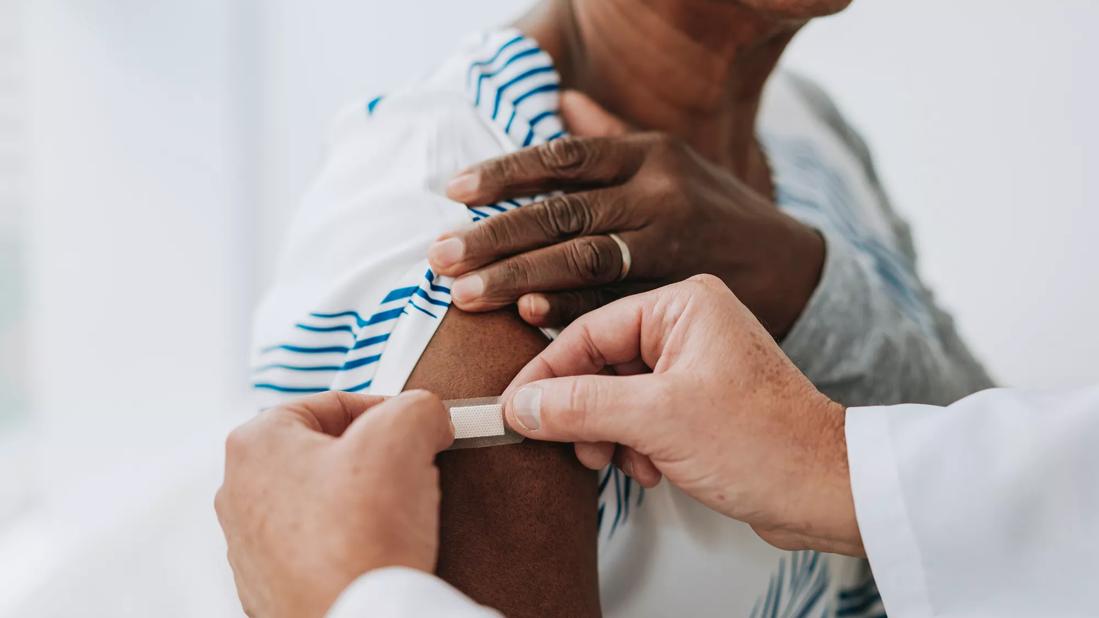Advertisement
Updated vaccinations are recommended to better protect against the evolving virus

Remember the rush to get a COVID-19 shot when the vaccines first arrived? Hundreds of millions of people rolled up their sleeves and got jabbed to protect themselves and others from the virus.
Advertisement
Cleveland Clinic is a non-profit academic medical center. Advertising on our site helps support our mission. We do not endorse non-Cleveland Clinic products or services. Policy
Today, of course, the pandemic is over, but COVID-19 continues to circulate and infect people around the world. It’s not gone.
That’s why being up to date on COVID-19 vaccinations remains a global health priority, says infectious disease specialist Kristin Englund, MD. Here’s what you need to be considered fully vaccinated for COVID-19.
COVID-19 continues to evolve with new variants and subvariants emerging. Dozens of different strains have been reported since 2020. Today, omicron and its offshoots are the predominant variants circulating.
As the virus goes through these changes, your body’s defense against these new attackers needs to be reinforced. “Mutations to the virus go well beyond what the initial vaccines covered,” says Dr. Englund.
That’s why the U.S. Centers for Disease Control and Prevention (CDC) recommends getting an updated 2023–2024 COVID-19 vaccine to better protect yourself against newer variants and serious illness.
Three updated 2023–2024 vaccines are available: Pfizer-BioNTech, Moderna and Novavax.
COVID-19 vaccination guidance from the CDC varies by a person’s age, vaccination record and health condition. Here’s a rundown:
Recommendations for this age group are:
One updated Moderna or Pfizer-BioNTech vaccine is recommended for children in this age group who are either unvaccinated or previously got a vaccine before September 12, 2023.
Recommendations for this age group are:
For this age group, an additional dose of any updated COVID-19 vaccine is recommended at least four months following the first updated dose.
Those who are moderately or severely immunocompromised may benefit from additional doses of an updated COVID-19 vaccine. Talk to your healthcare provider about your specific timing needs.
Advertisement
Vaccines train your immune system to recognize and destroy harmful invaders (such as COVID-19). They teach your body to protect itself by giving intel on potential threats. (Basically, it’s a biological cheat sheet.)
It takes about two weeks after getting a COVID-19 vaccination for your body to build up immunity against the virus, says Dr. Englund. After that, you’re considered “fully vaccinated” against COVID-19.
Data from the CDC shows the effectiveness of COVID-19 vaccines. A 2024 report shows that people who received an updated vaccine were 54% less likely to get COVID-19. (The findings focus on the four months from mid-September 2023 to January 2024.)
But that protective power naturally declines over time. Dr. Englund says COVID-19 vaccines generally hold firm against the virus for about a year. After that, the shielding effect loses some oomph.
New COVID-19 variants also can lessen the effectiveness of vaccines over time.
“As the virus mutates and changes the vaccine loses some of its efficacy in addition to waning over time,” explains Dr. Englund. “Getting an updated vaccine is important to protect yourself and those around you.”
Getting COVID-19 also educates your immune system on the virus and offers some security against future infection. But like vaccines, that immunity lessens over time and doesn’t cover new variants.
The CDC recommends getting an updated COVID-19 vaccine even if you have had the virus. (The suggested wait time is 90 days after infection.)
Research shows that people who don’t get vaccinated after recovering from COVID-19 are more likely to get reinfected than those who get an updated vaccine to boost their natural immunity.
More than 98% of the population in the United States has some protective immunity against COVID-19 through vaccination, prior infection or some combination of the two, according to the CDC.
But CDC data shows that a much smaller percentage has received an updated COVID-19 vaccine.
Looking ahead, Dr. Englund envisions vaccination against COVID-19 following a similar pattern as what’s done for influenza (aka, the flu). In other words, an annual shot to guard against infection and serious illness.
There’s even work underway on a combined flu/COVID-19 vaccine.
“This all falls under the concept of public health,” says Dr. Englund. “Getting vaccinated is part of our moral obligation to make sure we’re doing everything we can to lower the spread of these viruses and protect those around us.”
Advertisement
Learn more about our editorial process.
Advertisement

Most routine vaccines are safe for people living with multiple sclerosis — but be sure to talk with your care team about your needs

The medication is ineffective and — in the case of animal ivermectin — potentially dangerous

Enteroviruses are often to blame for summer colds, leading to a runny nose, sore throat and digestive symptoms

Redness, swelling, itching and rash can happen when your body’s immune system reacts to the vaccine injection

Studies suggest 1 in 5 people infected with the coronavirus never develop symptoms

An increased risk of blood clots can last for nearly a year after a COVID-19 diagnosis

The answer varies from person to person and vaccine to vaccine

COVID-19 may be associated with tinnitus, but research is still ongoing

Focus on your body’s metabolic set point by eating healthy foods, making exercise a part of your routine and reducing stress

PFAS chemicals may make life easier — but they aren’t always so easy on the human body

While there’s little risk in trying this hair care treatment, there isn’t much science to back up the claims